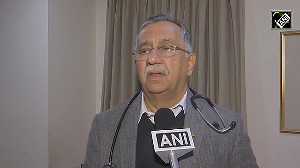With farmers incomes' increasing despite inflation nearing zero, Prime Minister Manmohan Singh on Tuesday exuded confidence that the economy would revive in a big way in 6-7 months as the stimulus packages work their way through the system.
"I am confident that because of the stimulus that our government has announced, later by (Finance Minister) Pranab Mukherjee, in the next six to seven months the revival of the Indian economy should take place in big way," the Prime Minister said on the occasion of releasing the manifesto of the Congress.
The government announced stimulus packages in December and January, cutting excise duty by four per cent, increasing public expenditure and giving more leeway to infrastructure finance company IIFCL to raise tax-free bonds.
Later, the Finance Minister announced a further two per cent cut in excise duty and also service tax, among other stimulus measures.
Singh said inflation has declined sharply due to a fall in energy prices, but food prices have not fallen as the government sought to increase incomes in rural areas.
"Farmers have never been given such increases in terms of procurement prices as in the last five years of the UPA government," he said.
Singh said since farmers are well looked after, there is demand in rural areas for housing, giving a boost to sectors like cement and steel despite recession.
Hit hard by the negative growth in the manufacturing and agricultural sectors, the economy expanded at a meager 5.3 per cent during the third quarter of this fiscal even as it grew by over 7.5 per cent in the first two quarters.
Inflation on the other hand declined to over three-decade low of 0.44 per cent but food prices remained high.
While the government claimed that food prices fell 0.7 per cent during the week ended March 7 compared with the previous week, the general price line for products under this category rose by over 7 per cent from the same week last year.
In fact due to higher weight of food items in the consumer price indices, retail price inflation hovers between 9-10 per cent.
The procurement prices of various farm products rose during the UPA regime. For example, paddy common variety used to fetch Rs 550 per quintal of minimum support price in 2003-04, but it rose steadily to Rs 850 a quintal in 2008-09.
In its manifesto, the Congress said it is firmly committed to maintaining high growth with low inflation, particularly in relation to prices of essential agricultural and industrial commodities.






 © 2025 Rediff.com -
© 2025 Rediff.com -